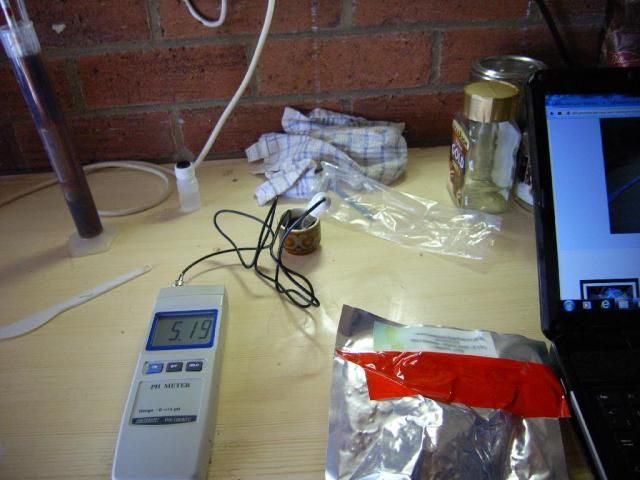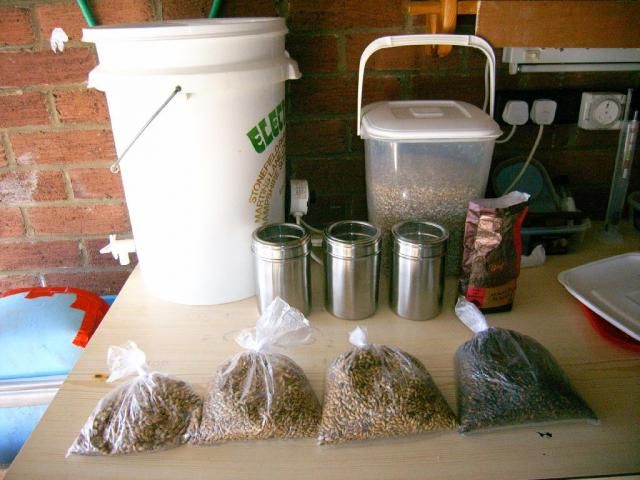Well, when I get a garage, and when I feel disposed to pointing it I'll bear that in mind, EricEric wrote:Oh goodness! I can't remember. Looking for my notes but it can't be V by anything as in its pure state it is a gas.
Mine was 37% , 12 molar I think. 1 mole weighs (1 + 35.5) = 36.5g, so 12 molar is 438g pure acid in 1 litre solution. So it must be W/W as it doesn't appear to be W/V.
1ml would neutralise 600mg CaCO3 when it was tested after it arrived.
I've written 18% on the diluted bottle which is manageable if treated with caution. 1ml of that will knock out about 280mg CaCO3 if my memory serves me right.
Interesting you prefered the sulphate biased version.
By the way, hydrochloric acid is handy for other purposes. Last year I pointed the front of the garage above the door and I'm not good at that. Using it more diluted with a paint brush onto the brick faces when the cement had dried, then hosing down the area with a fine spray resulted in a job I could be proud of.
water profile for a guinness clone
-
Dave S
- Even further under the Table
- Posts: 2514
- Joined: Sun Apr 01, 2012 5:38 pm
- Location: Wirral, Merseyside
Re: water profile for a guinness clone
Best wishes
Dave
Dave
- Eric
- Even further under the Table
- Posts: 2919
- Joined: Fri Mar 13, 2009 1:18 am
- Location: Sunderland.
Re: water profile for a guinness clone
Hope the brew is going well. I'd hoped Martin would have had more to add from his experience before digging out mine, but here we go.daddies-beer-factory wrote:Thanks Mabrungard & Eric,
I brewed it yesterday, brewday went well & it was my first all - grain stout / guinness. I took Erics advice & dropped the alkalinity down from 194 to 100mg/L for the mash & 50mg/L for the sparge. I added 2 crushed campden tablets and a tiny amount of salts.
I used the roasted barley in the mash full length, which is why mash ph was low i guess ( ph = 4.9) , I would be interested to know what difference it makes if you add the roast barley for the last 10 mins only ?
I hopped with Admiral to 45 IBU & pitched a Nottingham yeast (I will ferment for 12 days at 20 C - and crash cool for another 2 days)


The first picture is of an actual pH measurement taken at my most recent brew of a Guinness style based around Dave Line's suggested 70/20/10, with the second picture showing the grains used, at the front are the 20/10 bits processed in the kitchen from raw barley.


Mains water with 55ppm calcium, 18 magnesium, 18 sodium, 96 sulphate and 26 chloride and alkalinity of 120 mg/l CaCO3 had its alkalinity reduced to 70 for the mash.
Sparge alkalinity was further lowered and calcium content was increased to a sufficient and preferred level for the rest of the process to be 142ppm with a 2;1 bias of chloride. As you have seen, pH was 5.2.
For the influence of dark grains in a pale mash you might be interested in the following extract of testing by myself and reported in another place on November 23rd last.
Today I did another with 3 samples in a similar setup with a pH meter but without pictures.
Tap water alkalinity was 150ppm CaCO3 and using CRS some was treated to 25ppm CaCO3 alkalinity. No salts were added.
Sample 1 liquor was raw tap water.
Sample 2 was half tap and half treated, so alkalinity was 87.5ppm.
Sample 3 was wholly treated at 25ppm.
Each had 150ml liquor and 50g of pale malt, mashed at about 66C for 12 minutes when a wort sample was taken. 2g (4%) of black malt was then added to the mash and the temperature maintained for a further 20 minutes while the wort samples were cooled and pH measurements taken. Then further samples were taken with the additional black malt and measued for pH.
Sample 1, alk 150ppm, pH(1) 6.23, pH(2) 5.71.
Sample 2, alk 87.5ppm, pH(1) 5.87, pH(2) 5.51.
Sample 3, alk 25 ppm, pH(1) 5.52, pH(2) 5.43.
At the time of those tests it was thought the calcium content was 60ppm and magnesium 25ppm.
What do you think Martin?
Without patience, life becomes difficult and the sooner it's finished, the better.
-
daddies-beer-factory
Re: water profile for a guinness clone
Hope the brew is going well.
Thanks Eric,
Its sitting in the fermentation chamber, since last saturday. I will let it sit on the yeast for a total of 14 days, the last couple I will turn the temp down to 5 C to drop out the yeast.
Not much Krausen - from Nottingham yeast (its now completely gone), when I use US -05 I will get krausen for most of the 14 days but with Nottingham its gone after a few days. But it smells like its doing the right thing.
Thanks Eric,
Its sitting in the fermentation chamber, since last saturday. I will let it sit on the yeast for a total of 14 days, the last couple I will turn the temp down to 5 C to drop out the yeast.
Not much Krausen - from Nottingham yeast (its now completely gone), when I use US -05 I will get krausen for most of the 14 days but with Nottingham its gone after a few days. But it smells like its doing the right thing.
-
daddies-beer-factory
Re: water profile for a guinness clone
Quick update, the Guinness clone is cracking - drinking a pint now out of the corny. (2 weeks in fv & 10 days in corny) The Notty Yeast only got down to 1018, so it only ended up at 3.4% but its the best Guinness i have had at home (compared to bottled/canned supermarket stuff).
Thanks for all the help !!!


Thanks for all the help !!!
- Eric
- Even further under the Table
- Posts: 2919
- Joined: Fri Mar 13, 2009 1:18 am
- Location: Sunderland.
Re: water profile for a guinness clone
Thanks for the update, nice to read you've got a good result.
Might I suggest keeping your brewing and tasting notes to use for future variations and comparison. One thing I'd be reluctant to alter would be Dave Line's 70/20/10 recipe.
Good luck.
Might I suggest keeping your brewing and tasting notes to use for future variations and comparison. One thing I'd be reluctant to alter would be Dave Line's 70/20/10 recipe.
Good luck.
Without patience, life becomes difficult and the sooner it's finished, the better.

